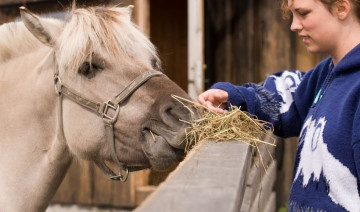
Refeeding Starved Horses
A horse may lose body weight and condition for many reasons. No matter the cause of the animal’s extreme weight loss, however, refeeding starved horses requires careful dietary management and conscientious nutritional awareness to help the horse regain weight safely and effectively.
Why Horses May Lose Weight
There can be many causes for horses to lose weight dramatically. In some cases, illness, parasites, or injuries can affect the horse’s ability to eat or to get sufficient nutrition from its feed. Other horses may have social problems with other animals at feeding time, and could be intimidated or bullied away from adequate meals. Poor quality feed may not be meeting the horse’s nutritional needs, or economic hardship may force an owner to underfeed horses. Abandoned or escaped animals may also have difficulty finding adequate nutrition, and can lose body weight very quickly.
When a horse does not get the proper nutrition, the animal will quickly begin to metabolize stores of fat and carbohydrates to meet its energy needs. When those internal supplies are exhausted, the animal will begin breaking down muscle tissue. The horse’s body weight can drop dramatically, and the animal will be subject to cold sensitivity and hypothermia because it lacks insulating fat. Eventually, the horse’s immunity will also become compromised, and other health issues will surface.
Tips for Refeeding Starved Horses
When a severely underweight horse is discovered, refeeding must be undertaken in a slow, methodical manner or the horse could suffer from refeeding syndrome. This occurs when too much high-calorie, concentrated food such as pellets or grain is offered too quickly, and the insulin spike from the horse’s reactivated metabolism can cause severe, even fatal, damage to the heart, kidneys, and respiratory system.
Before beginning any refeeding regimen, it is critical that the horse undergo a thorough veterinary examination. This can reveal any underlying problems that may have contributed to the animal’s weight loss, as well as determine the best nutritional program to help the horse adjust to eating again. The exam should include dental analysis and consideration for deworming to be sure the horse is ready and able to begin refeeding comfortably.
For the first 10-14 days of refeeding a starved horse, the animal should be offered more frequent but smaller meals of good quality grass hay or alfalfa. This will help the horse’s metabolism adjust to greater nutrition without overwhelming its digestion. As the horse becomes accustomed to feeding, larger meals can be offered with less frequency. To properly refeed a starved horse…
- Monitor the animal closely at all times to see how well it eats and how its digestion reacts to new food and increased nutrition.
- Avoid concentrate feeds such as pellets or grain for at least 3-5 days to allow the horse’s metabolism to adjust slowly.
- Limit pasture time to just 2-3 hours per day for grazing and foraging. That time can be gradually increased every few days as the horse adjusts.
- Provide fresh, clean water to the horse at all times, and be sure all drinking troughs are cleaned and sanitized regularly.
- Consult a veterinarian about the possibility of adding vitamin supplements to the animal’s diet, and take care to only offer the appropriate dosage.
- Avoid riding a starved horse for several weeks or months as the animal regains condition in order to allow muscles to adjust accordingly.
Depending on the horse’s initial condition and the extent of its starvation, as well as its overall age, size, and other health concerns, it can take 3-5 months or longer to refeed a starved horse back to a goal weight and muscle tone. Refeeding isn’t always successful, but with patience and great care to adequate nutrition and a slow-and-steady approach to the proper diet, horses can regain lost weight and improve their condition even after being underweight and starved.
